Remembrance Day
“At the eleventh hour on the eleventh day of the eleventh month – we will remember them.”
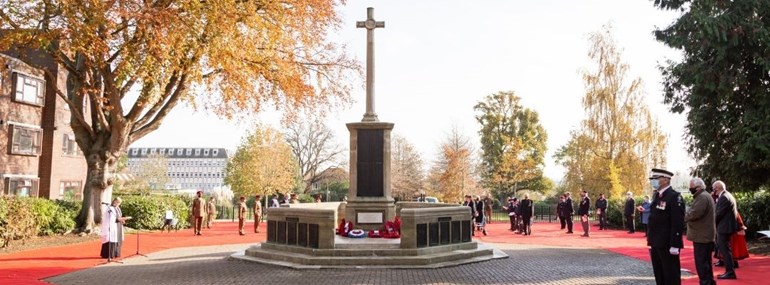
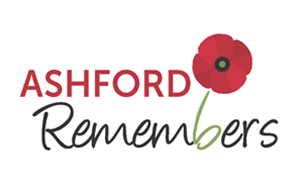
Armistice Day or Remembrance Day: What is it and why is it important?
Armistice Day, often referred to as Remembrance Day, is on 11 November. The Armistice was an agreement to end the fighting of the First World War at 11am on 11 November 1918. It put an end to four years of conflict that resulted in the death of more than 16 million people – soldiers and civilians alike.
To commemorate the armistice agreement a remembrance is observed – on the eleventh hour of the eleventh day of the eleventh month – and the day has become known as Remembrance Day.
Remembrance Day was first observed in 1919 throughout the British Commonwealth. To this day, we mark Remembrance Day around the United Kingdom with a Two-Minute Silence at 11am on the 11 November.
Why do we hold a Two-Minute Silence?
The first Two-Minute Silence in Britain was held on 11 November 1919, when King George V asked the public to observe a silence at 11am. He made the request so "the thoughts of everyone may be concentrated on reverent remembrance of the glorious dead".
Remembrance Sunday
There is also Remembrance Sunday every year, which falls on the second Sunday in November – this year it is on 12 November. Remembrance Sunday is a day to commemorate the contribution of British and Commonwealth military and civilian servicemen and women in the two World Wars and later conflicts.
The National Service of Remembrance at the Cenotaph in London is held on Remembrance Sunday. The service is attended by senior members of the Royal Family, including His Majesty The King, HM Government and features a March Past involving 10,000 veterans.
Ashford Remembers 2024
Ashford Borough Council held its annual Remembrance Sunday service in the Memorial Gardens on Sunday 10 November 2024. This was proceed by a special Sunday service at St Mary the Virgin church in Ashford Town Centre, attended by the Mayor of Ashford, Cllr Lyn Suddards.
 (Above) The band of the Ashford Sea Cadets on parade.
(Above) The band of the Ashford Sea Cadets on parade.
 (Above) The Royal British Legion Standard Bearers entering Memorial Garden.
(Above) The Royal British Legion Standard Bearers entering Memorial Garden.
 (Above) Dignitaries, including the MP for Ashford, Sojan Joseph, The Deputy Lord-Lieutenant of Kent, Sir George Jessel, and the Mayor of Ashford, Cllr Lyn Suddards, at the Remembrance Service in Memorial Gardens.
(Above) Dignitaries, including the MP for Ashford, Sojan Joseph, The Deputy Lord-Lieutenant of Kent, Sir George Jessel, and the Mayor of Ashford, Cllr Lyn Suddards, at the Remembrance Service in Memorial Gardens.
 (Above) Ashford Cadets and Standard Bearers in Memorial Gardens.
(Above) Ashford Cadets and Standard Bearers in Memorial Gardens.
 (Above) The Mayor of Ashford, Cllr Lyn Suddards, together with the Chaplin of the Royal British Legion, Revd Dr Sue Starkings.
(Above) The Mayor of Ashford, Cllr Lyn Suddards, together with the Chaplin of the Royal British Legion, Revd Dr Sue Starkings.
 (Above) Dignitaries on parade in Ashford town centre.
(Above) Dignitaries on parade in Ashford town centre.
 (Above) The Ashford Sea Cadets on parade on Remembrance Sunday.
(Above) The Ashford Sea Cadets on parade on Remembrance Sunday.
 (Above) The Remembrance Sunday parade passing the Mayor of Ashford, Cllr Lyn Suddards.
(Above) The Remembrance Sunday parade passing the Mayor of Ashford, Cllr Lyn Suddards.
Ashford Remembers 2023
Ashford Borough Council held its annual Remembrance Sunday service in the Memorial Gardens on Sunday 12 November 2023. This was proceed by a special Sunday service at St Mary the Virgin church in Ashford Town Centre, attended by the Mayor and Armed Forces representatives.
 (Above) The Ashford Remembrance service in Memorial Gardens on 12 November.
(Above) The Ashford Remembrance service in Memorial Gardens on 12 November.
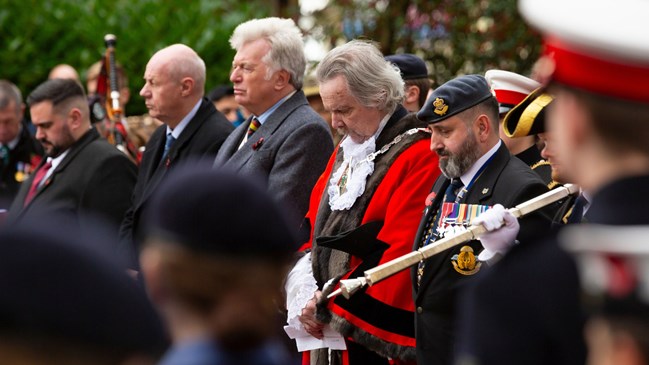 (Above) The Mayor of Ashford in attendance with local dignitaries at the Remembrance service in Memorial Gardens.
(Above) The Mayor of Ashford in attendance with local dignitaries at the Remembrance service in Memorial Gardens.
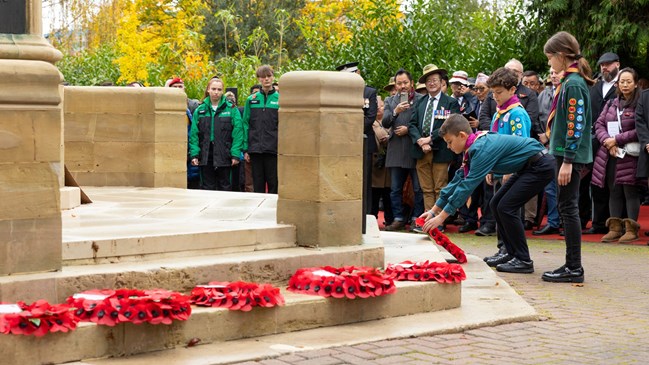 (Above) The Scouts laying a wreath at the War Memorial.
(Above) The Scouts laying a wreath at the War Memorial.
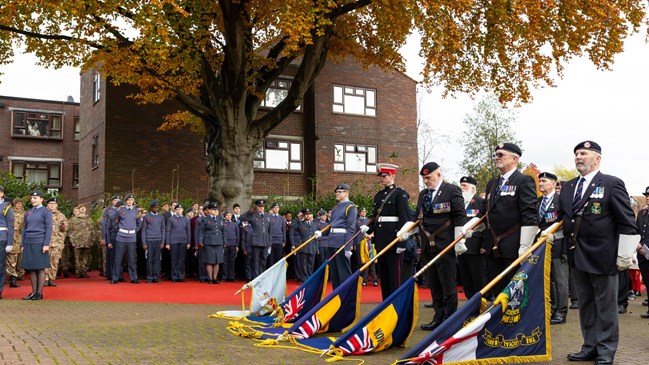 (Above) The Colour Party dipping the flags for the National Anthem.
(Above) The Colour Party dipping the flags for the National Anthem.
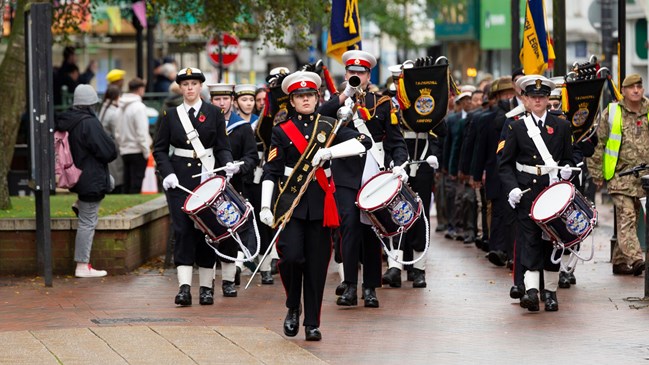 (Above) The Band of the Ashford Sea Cadets on parade in the High Street.
(Above) The Band of the Ashford Sea Cadets on parade in the High Street.
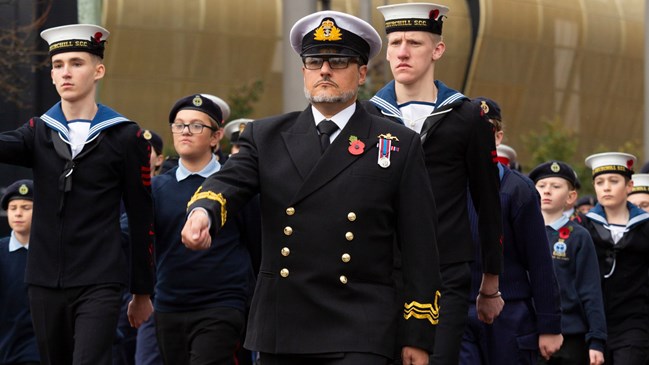 (Above) The Ashford Sea Cadets on parade on Remembrance Sunday.
(Above) The Ashford Sea Cadets on parade on Remembrance Sunday.
A History of Remembrance in Ashford
In 2022 Ashford Borough Council held its annual Remembrance Sunday Commemoration Service in the Memorial Gardens on Sunday 13 November 2022. Dignitaries, invited representatives and veterans were invited into the Garden of Remembrance where the Mayor of Ashford and other distinguished guests laid wreaths. A selection of photos are available to view in the image gallery below, click the arrows to scroll left and right.
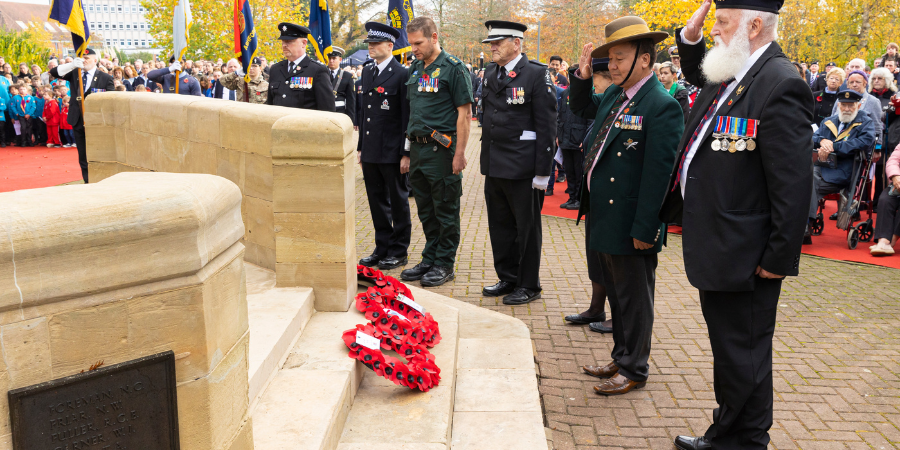
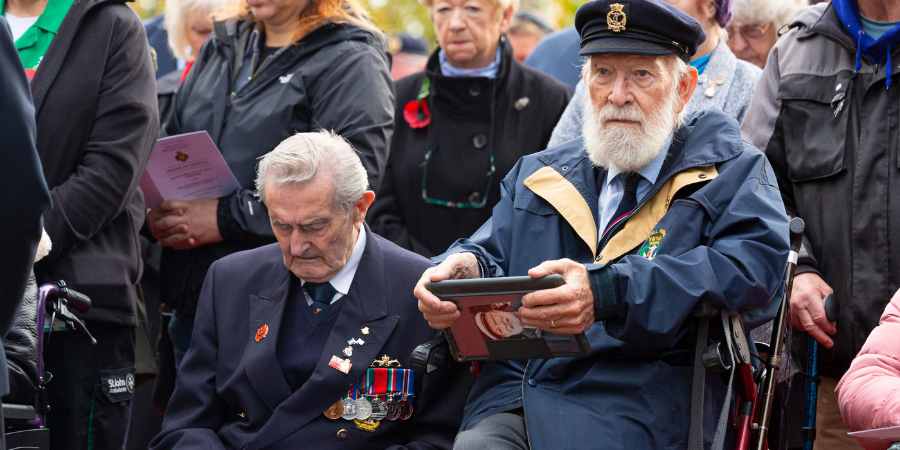
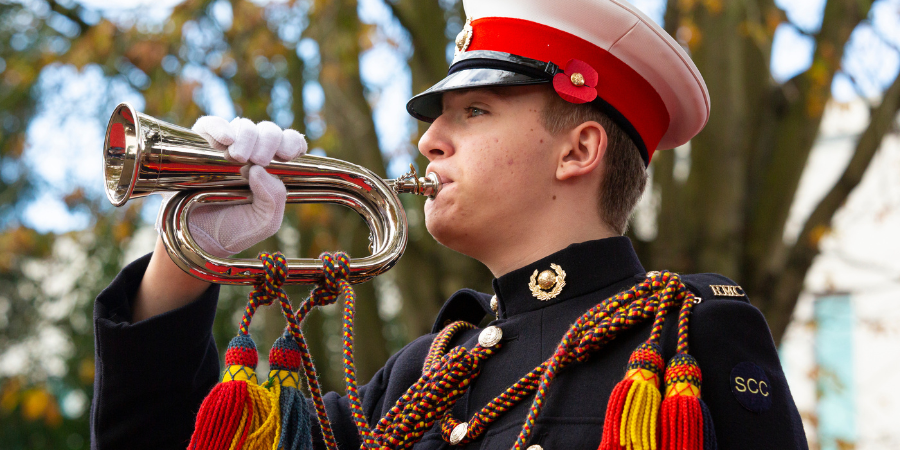
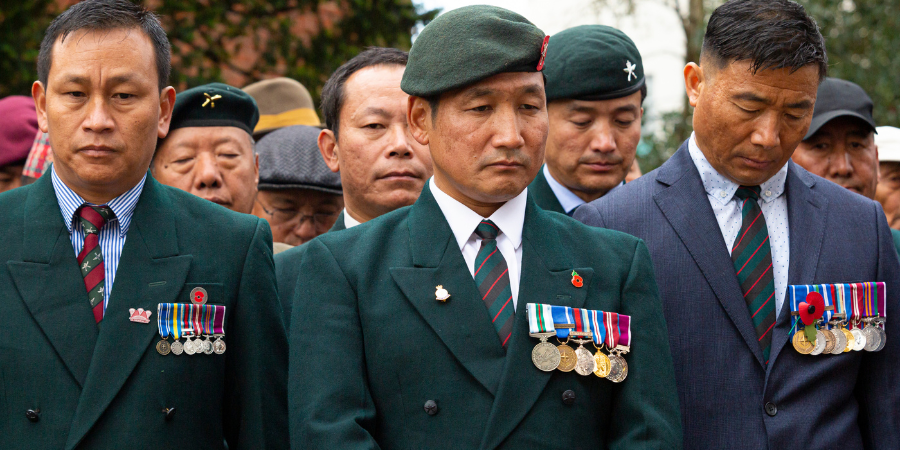
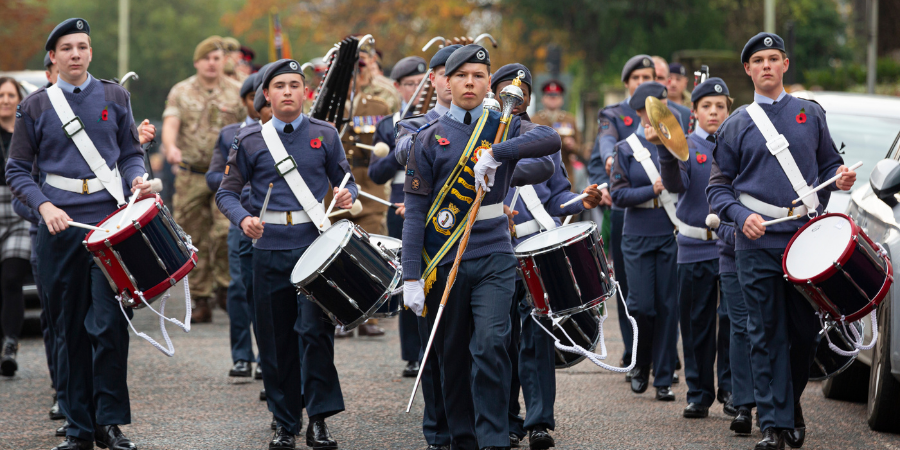
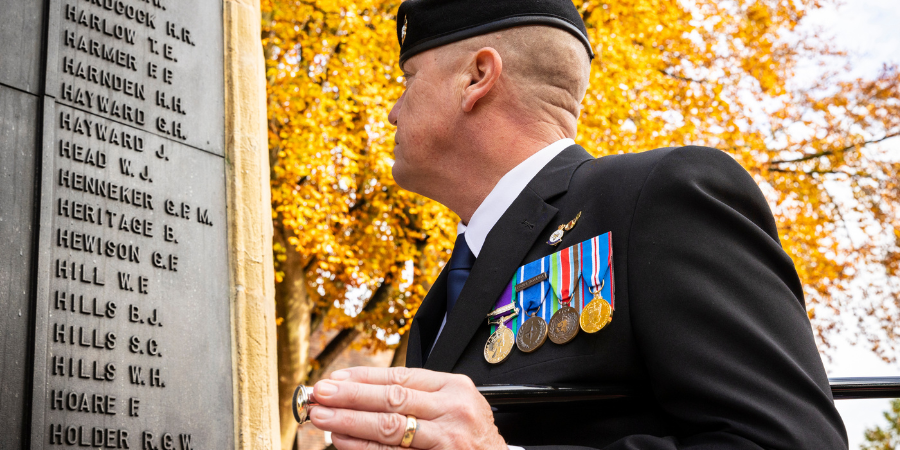
At 9.30 a.m. on 13 November, there was a special Remembrance Sunday service at St Mary the Virgin church in the centre of Ashford, attended by the Mayor and Armed Forces representatives. The service included hymns, prayers, and music with organ and choir.
In 2021 Ashford held a service for invited guests in the Memorial Gardens to mark Remembrance Sunday. This was a short service that included the laying of wreaths and two minutes of silence at 11 a.m.
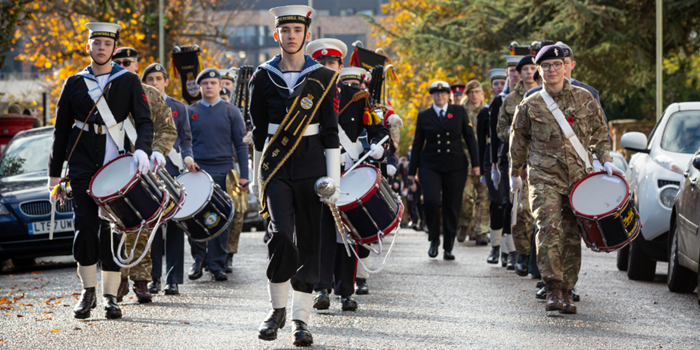 (Above) The Band of the Ashford Sea Cadets Parading to the Memorial Gardens.
(Above) The Band of the Ashford Sea Cadets Parading to the Memorial Gardens.
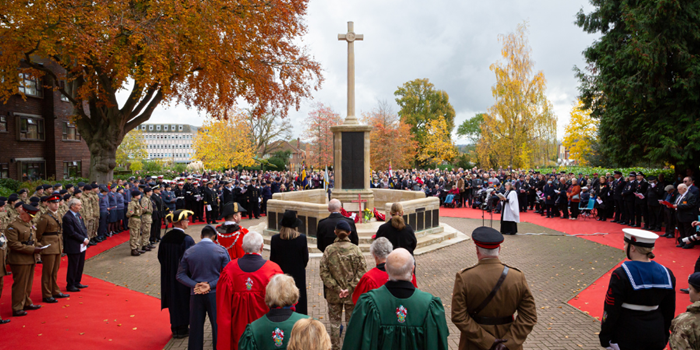 (Above) Remembrance Service 2021 at the Memorial Gardens, Ashford.
(Above) Remembrance Service 2021 at the Memorial Gardens, Ashford.
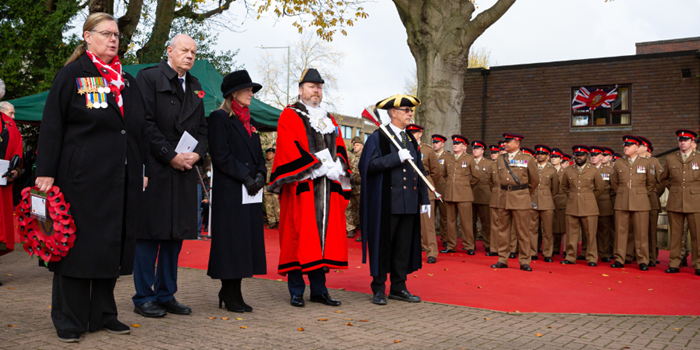 (Above) The Mayor of Ashford 2021-22 joined by local dignitaries for the Remembrance Sunday Service 2021.
(Above) The Mayor of Ashford 2021-22 joined by local dignitaries for the Remembrance Sunday Service 2021.
In 2020 Ashford Borough Council filmed the event and provided a live stream to enable the public to follow proceedings at home. The live stream was hosted on the council’s Facebook page, allowing residents to tune in via their computers or on a mobile device. This was the first time in history that the National Service of Remembrance events was closed to members of the public, in line with the Government’s scientific and medical advice. The Mayor of Ashford, along with distinguished guests and invited representatives were in attendance to lay the wreaths. There was no procession and wreath layers were asked to report direct to the Memorial Gardens.
For those who were unable to watch the live stream, an edited version of Ashford's 2020 Remembrance Sunday service is available to watch below:
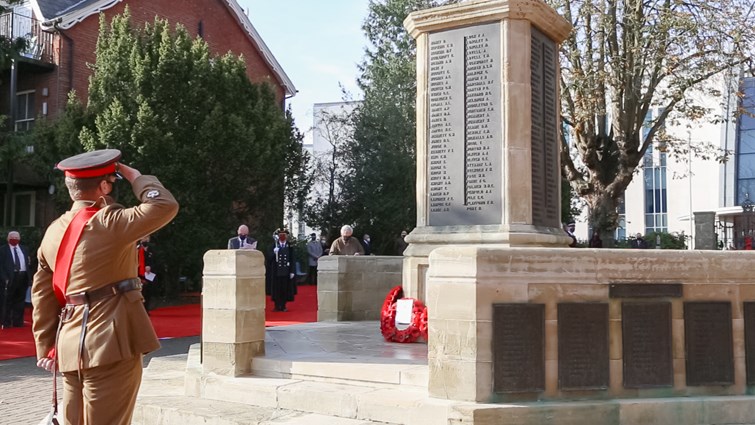 (Above) Remembrance Service, Memorial Gardens, Ashford 2020.
(Above) Remembrance Service, Memorial Gardens, Ashford 2020.
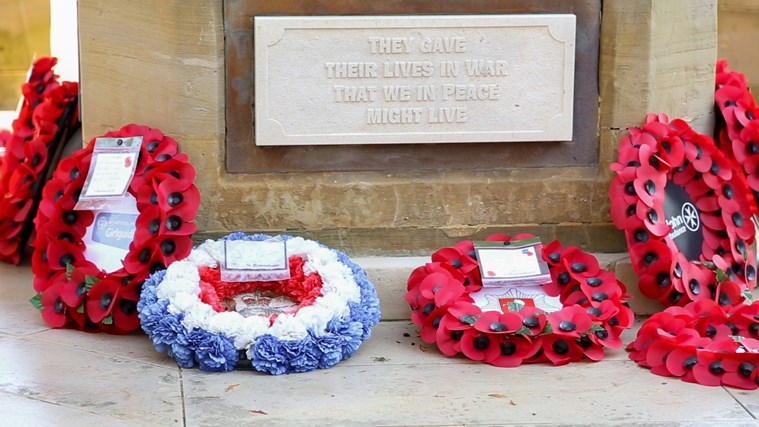 (Above) Wreaths laid as part of the Remembrance Service, Memorial Gardens, Ashford 2020.
(Above) Wreaths laid as part of the Remembrance Service, Memorial Gardens, Ashford 2020.
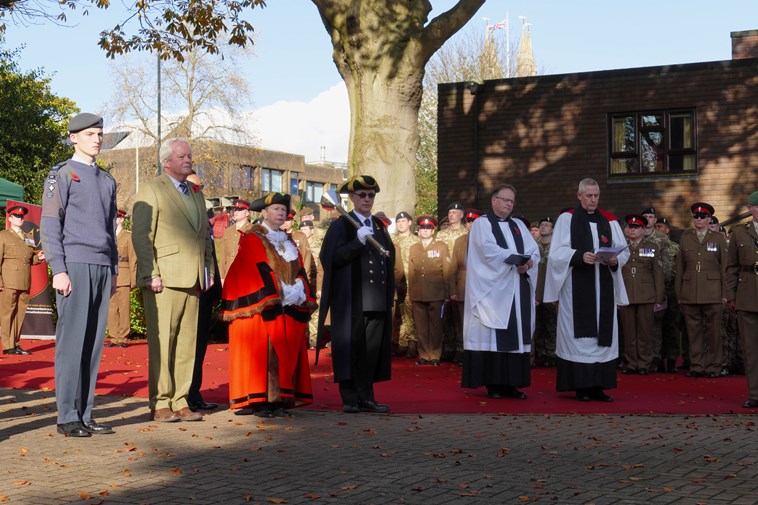 (Above) Remembrance Sunday Service, Memorial Gardens, Ashford, 2019. Image courtesy of Andrew Clarke.
(Above) Remembrance Sunday Service, Memorial Gardens, Ashford, 2019. Image courtesy of Andrew Clarke.
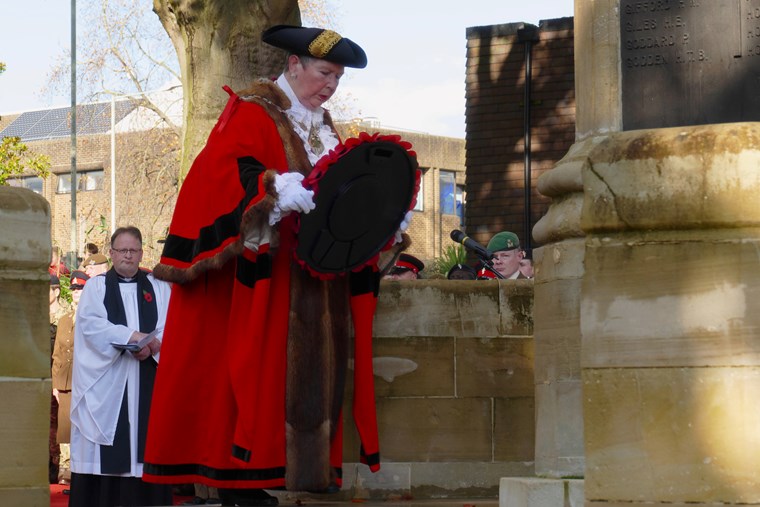
(Above) Remembrance Sunday Service, Memorial Gardens, Ashford, 2019. Image courtesy of Andrew Clarke.
Ashford War Memorial, Memorial Gardens
“They gave their lives in war that we in peace might live” (inscription)
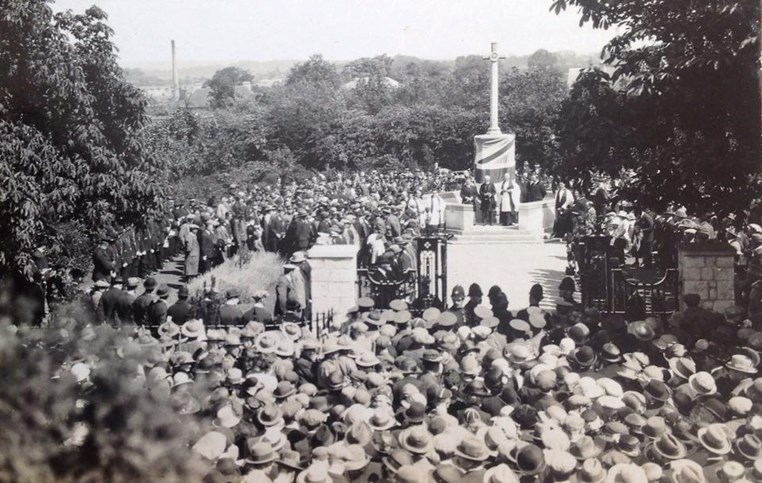
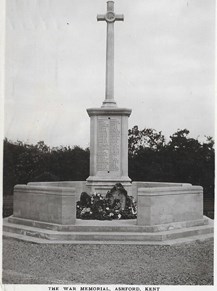
The Ashford War Memorial was designed by local architect Edwin A Jackson and unveiled on 1 June 1924 by General Sir Ian Hamilton GCB GCMG DSO, Commander of the British Mediterranean Expeditionary Force at Gallipoli. The land, memorial and ornate wrought iron gates of remembrance were funded by public subscription which by 1924 had raised more than £10,000.
The names of 250 of the fallen of the First World War were inscribed on the memorial and among those named is Sergeant Harry Wells, 2nd Battalion, Royal Sussex Regiment, who was awarded a posthumous Victoria Cross at the Battle of Loos in 1915. Following the Second World War, further names, including civilians, were added on plaques affixed to the low walls surrounding the memorial.
Today this elegant memorial and its elaborate memorial gates stand testament to the sacrifice and memory of those who gave their lives in subsequent conflicts throughout the world.
The Unknown Warrior
The Unknown Warrior is a British First World War soldier unknown by name or rank, brought from France to Westminster Abbey to be buried on 11 November 1920. The body of the Unknown Warrior was taken by train from Dover to London and the railway carriage in which it was carried is now in the care of the Kent & East Sussex Railway.
The same railway vehicle had been previously used to transport the body of Nurse Edith Cavell, who was executed by the Germans in October 1915 for helping British soldiers to escape, and it is now known as “The Cavell Van”. Other repatriated heroes it carried included Capt. Edward Fryatt, executed by the Germans in Bruges in 1916.
The Cavell Van is cherished by the Tenterden-based railway, where it is a popular attraction. It has been lovingly restored and contains a replica of the Unknown Warrior’s beautiful coffin, as well as stories of the heroes it carried.
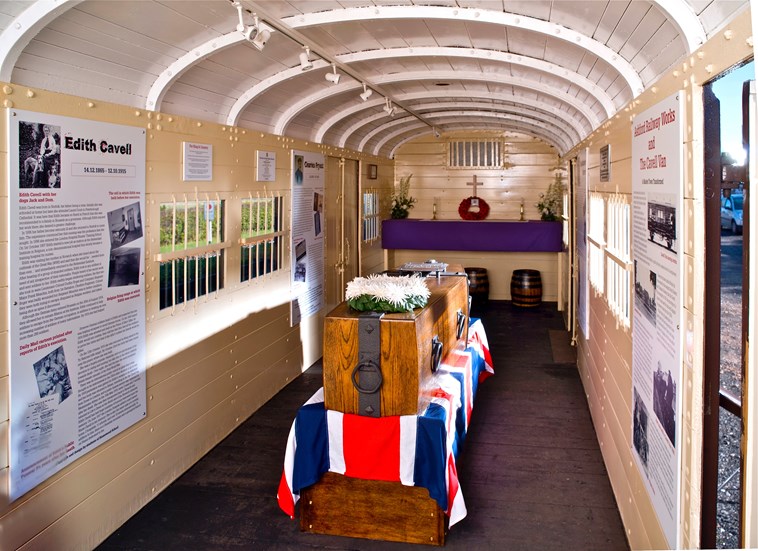
Pictured above: The Cavell Van on display at the Kent & East Sussex Railway. Image courtesy of Robin Dyce.
Remembrance Day: Why wear a poppy?
Find out more about why we wear poppies and where you can buy them from.







